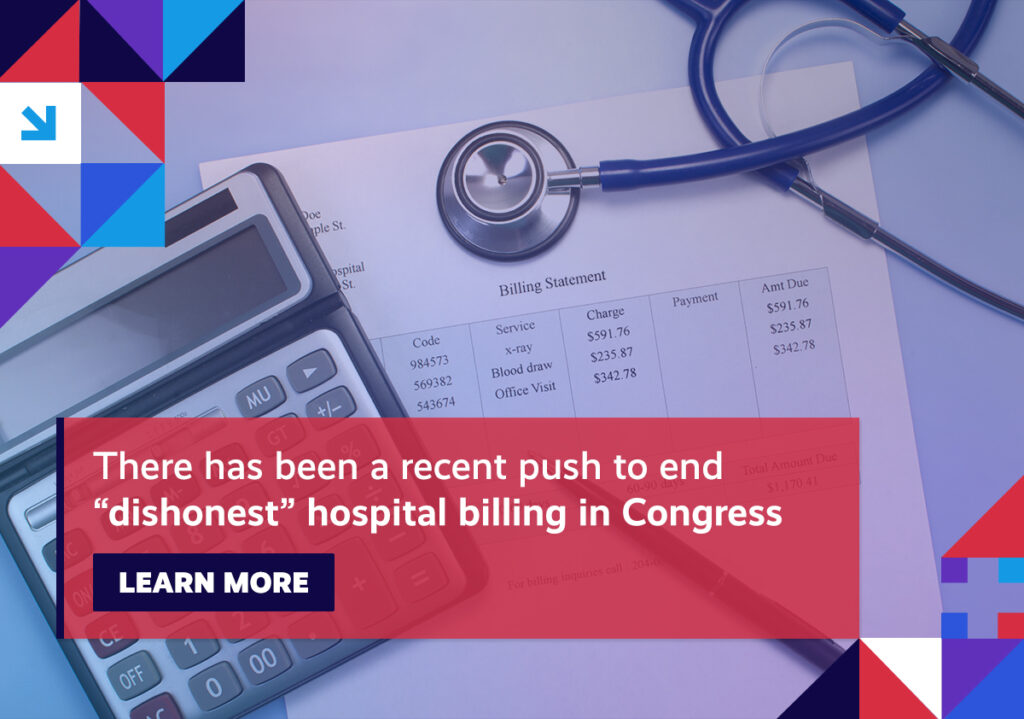A quick roundup of the issues driving the healthcare reform conversation.
Item of the Week

Spotlight
A deeper dive on the recent push to end “dishonest” hospital billing in Congress.
Further context: There’s been a recent bipartisan drive in Congress to end the costly practice known as “dishonest billing.” In the Senate, the Site-based Invoicing and Transparency Enhancement (SITE) Act, introduced by Senators Braun (R-IN), Hassan (D-NH), and Kennedy (R-LA), would ensure that patients are accurately billed for the location where their care takes place. The effort in the House is being led by Representatives Hern (R-OK) and Kuster (D-NH).
Driving the reform: Media outlets have highlighted how devastating and deceptive ”dishonest billing” can be for patients.One story, reported by NPR, tells of a woman whose doctor’s office was acquired by a hospital, which then billed a doctor’s visit as occurring in a “hospital-based setting.” The result: a $1,262 “operating room services” facility fee.
Digging deeper: Off-campus hospital outpatient departments currently are paid more for the same services that patients receive at independent physician offices. That’s because hospitals are billing Medicare and insurers as if the services delivered in off-campus outpatient departments were performed in a more expensive hospital setting.
By the numbers: The SITE Act will save taxpayers billions of dollars. In 2020, the Congressional Budget Office estimated taxpayers will pay close to $40 billion in excess costs to Medicare due to unreasonable facility fee payments over the next decade.
What it means: The SITE Act reduces costs for patients, while also removing a key incentive that’s driven hospital consolidation. Under the current system hospitals purchase off-campus physician practices and use the hospital’s national provider identification number and hospital billing forms to bill at hospital rates – a tactic under which the hospital receives higher payments. These higher reimbursements provide a big incentive for hospitals to buy physician practices when they can bill a higher charge for the same service, by the same doctor, at the same location.
What they’re saying:
Sen. Maggie Hassan:
“Granite Staters who have been going to the same doctor for years are experiencing sticker shock when a hospital acquires a doctor’s office or clinic and all of a sudden starts charging extra fees for the same services. Our bipartisan bill takes on the health care industry to eliminate unfair fees, lower costs for patients, and save taxpayer dollars—and then we use those savings to invest in the health care workforce. Lowering health care costs for Americans is a bipartisan priority, and I urge my colleagues on both sides of the aisle to support this commonsense bill.”
Sen. John Kennedy:
“Hospitals are gaming the system to charge Louisiana patients and taxpayers more for out-patient, off-site care. That’s wrong, and I’m proud to work with Sens. Braun and Hassan to make it right by correcting Medicare’s billing policy.”
Sen. Mike Braun:
“Hoosiers know our health care system is broken, and one problem we can fix right now is services at off-campus outpatient facilities being billed to Medicare at higher hospital rates. Fixing this problem will save taxpayers 40 billion over the next decade, and this bill will apply some of those savings to fixing our nursing shortage by creating a new program to pay for training.”
Threats: Despite the groundswell of support for this commonsense reform, lawmakers are up against a large and powerful lobbying campaign to defeat this profitable loophole.
Supporters: There is a large and growing bipartisan coalition which supports this commonsense reform. Among the supporters include:
- Americans For Prosperity
- Committee for a Responsible Federal Budget
- National Taxpayers Union
- Families USA
- American Benefits Council
Learn more: As the debate continues, be sure to follow along and keep an eye out for opportunities to add your voice to the conversation.
| You can keep up with the latest by following the Health Action Network on Twitter and by liking us on Facebook. And, be sure to check us out on LinkedIn, too. As always, let us know if there’s something you’d like to see covered in a future newsletter. |
The Health Action Network includes everyday Americans—families, workers, businesses, patients, providers, neighbors, and friends. We are working together because we support market-based solutions that offer better healthcare choices and help build a stronger economy. The Health Action Network is an Elevance Health, Inc., initiative.
